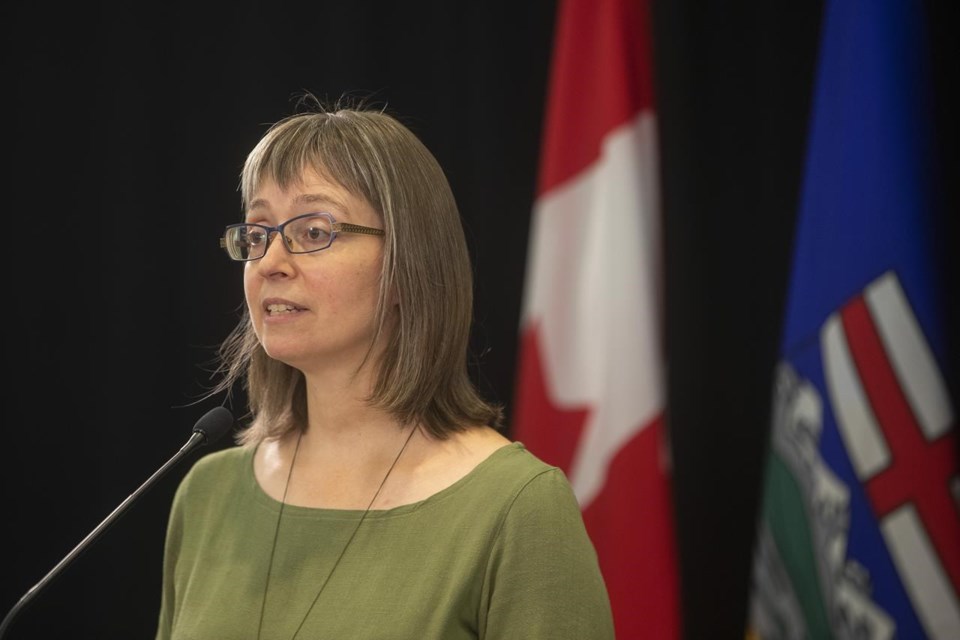EDMONTON — Alberta's chief medical officer of health says the more than 57,000 active cases of COVID-19 in the province are a tiny fraction of the true spread of the virus.
"I couldn’t give a specific number, but it’s very clear with 40 per cent positivity rate, that transmission is higher than it’s ever been before," Dr. Deena Hinshaw told reporters Monday.
"We should assume that at minimum we're seeing about 10 times or more the number of cases that we're diagnosing through PCR (tests).
"It's my belief that we need to prepare for a significant impact (to the health system) at this point given the cases we've seen."
Hinshaw said cases brought on by the Omicron variant have swamped testing — people wanting a PCR lab test need to book days in advance and are waiting up to two days to get results back.
Starting immediately, she said only high-risk cases are eligible for PCR tests, including continuing care residents and front-line health-care workers, in order to speed up processing.
"We're having significant challenges in getting timely access to testing and results for people who really need it to manage their clinical scenarios," she said.
Before that, those cases had been the priority for testing but those who did not have access to rapid tests could still book a PCR test.
"We're working hard to make rapid tests more widely available," said Hinshaw.
Opposition NDP health critic David Shepherd said the testing changes are another example of the failure of Premier Jason Kenney’s government to plan and prepare for COVID-19.
"With rapid tests still difficult to obtain in many places, I know many Albertans will feel abandoned by their government as the Omicron variant spreads out of control in their community," Shepherd said in a statement.
Shepherd called on the province to release the numbers and projections they are seeing on COVID-19 transmission.
"Albertans cannot trust the (United Conservative Party) as they continue to dodge their responsibility and refuse to be forthcoming with critical public health information," he said.
"They must release the (Alberta Health Services) two-week forecast and stop hiding the truth from Albertans."
Alberta recorded more than 17,000 new cases of COVID-19 over the last three days.
Hospitalization numbers continue to rise. There are 635 people in hospital with COVID-19 and 72 of them are in intensive care.
Also Monday, kindergarten and grade-school students returned to in-person learning after their winter break was extended by a week to allow schools to prepare for Omicron.
Education Minister Adriana LaGrange has said the first batch of medical masks and rapid tests will be in all schools by week’s end, but the Alberta Teachers’ Association has expressed concerns that the safeguards won’t be enough and that schools will have to close down again.
Kenney has said millions of rapid tests are due to arrive from a private source and from the federal government this month.
Hinshaw said vaccinations remain the best protection against COVID-19. Almost 90 per cent of eligible Albertans, those over age 12, now have at least one dose of vaccine.
Alberta has restricted access to non-essential services, such as bars and restaurants, to those who are not vaccinated.
That move has sparked public protests.
On Sunday, anti-vaccine protesters gathered outside the home of Calgary Mayor Jyoti Gondek.
Kenney condemned the protest on Twitter.
"This is just wrong," wrote Kenney. "There are plenty of opportunities to protest without disturbing the families and neighbours of public officials."
Days earlier, there was a similar demonstration outside the home of Health Minister Jason Copping.
This report by The Canadian Press was first published Jan. 10, 2022.
Dean Bennett, The Canadian Press



